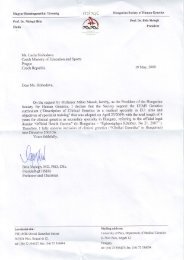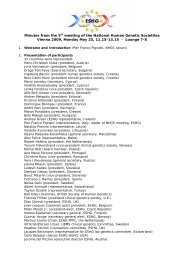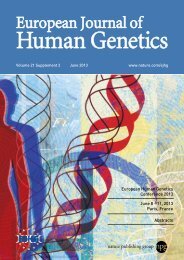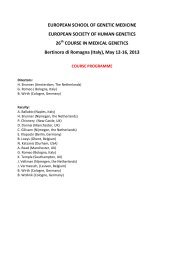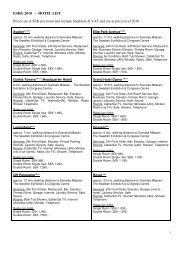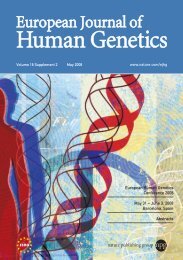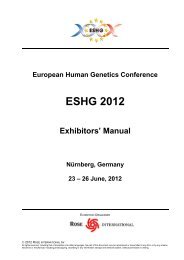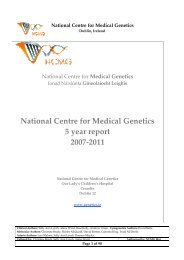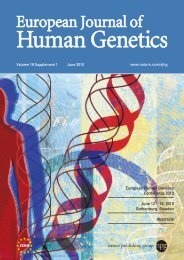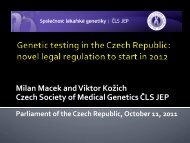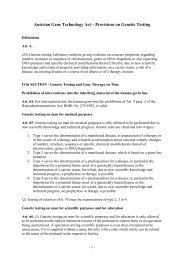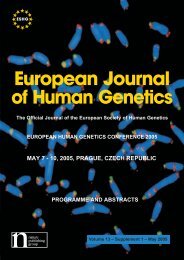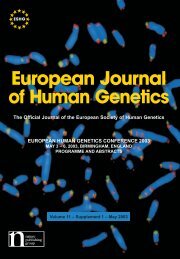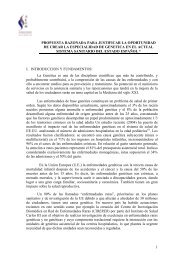2009 Vienna - European Society of Human Genetics
2009 Vienna - European Society of Human Genetics
2009 Vienna - European Society of Human Genetics
Create successful ePaper yourself
Turn your PDF publications into a flip-book with our unique Google optimized e-Paper software.
Genetic counseling <strong>Genetics</strong> education, Genetic services, and Public policy<br />
cian and other healthcare pr<strong>of</strong>essionals, law and legal field, journalism,<br />
etc.) can benefit from this progress.<br />
The web is an excellent complement to genetic counseling and a<br />
very useful teaching tool to clinicians and other healthcare pr<strong>of</strong>essionals,<br />
in order to complement medical personal consultations at specific<br />
points when teaching the patient, as you will see through the index<br />
web, as genetically inherited disorders are known across all medical<br />
specialties.<br />
the index web is:<br />
* Introduction, * The origin <strong>of</strong> life, * Cell specialization, * Chromosomes,<br />
* How do we acquire our inheritance, * What is heredity, * Types <strong>of</strong><br />
inheritance, * Why do disorders develop, * What happens when our<br />
recipes combine with our partner´s recipes?, *And how can we use this<br />
vast knowledge and benefit from it, * Origin <strong>of</strong> hereditary disorders, *<br />
Prenatal diagnosis techniques, *Gene Therapy, * Cloning, and stem<br />
cells, *Questions, * Links <strong>of</strong> interest, * Further reading, * Foreword.<br />
A FORUM, is included.<br />
Supplemented by static pictures and flash animation, at this moment<br />
is currently available on the Net in spanish, English, chinese and<br />
catalan.<br />
P01.32<br />
Health care needs assessment for medical genetic services in<br />
middle- and low-income nations<br />
A. L. Christianson 1 , R. Zimmern 2 , U. Krist<strong>of</strong>fersson 3 , J. Schmidtke 4 , A. Kent 5 ,<br />
R. Raouf 6 , C. Barreiro 7 , I. Nippert 8 ;<br />
1 National Health Laboratory Service & University <strong>of</strong> the Witwatersrand, Braamfontein,<br />
Johannesbrug, South Africa, 2 PHG Foundation, Cambridge UK, United<br />
Kingdom, 3 Dept Clinical <strong>Genetics</strong>, University Hosp Lund, Lund, Sweden, 4 Institute<br />
<strong>of</strong> <strong>Human</strong> <strong>Genetics</strong>, MHH, Hanover, Germany, 5 5GIG, London, United<br />
Kingdom, 6 Children with special needs Department, Ministry <strong>of</strong> Health, Cairo,<br />
Egypt, 7 Hospital de Pediatria SAMIC, Buenos Aires, Argentina, 8 Women’s<br />
Health Research, University <strong>of</strong> Muenster, Muenster, Germany.<br />
Background: Consequent on improving health, education and infrastructure<br />
many middle- and some low-income nations have experienced<br />
epidemiological transition resulting in congenital and common<br />
complex disorders becoming health care priorities. The WHO [2000]<br />
recommended that developing countries implementing medical genetic<br />
services should produce a ‘country report’, in essence a strategic<br />
health care plan. The first component <strong>of</strong> such a plan is a health<br />
care needs assessment (HCNA). In the 1970s industrialised nations<br />
standardised the process <strong>of</strong> HCNA. The approach was never applied<br />
to medical genetic services. Experience from advising middle-income<br />
nations on developing their nascent medical genetic services indicates<br />
they are not undertaking HCNA. A major impediment is the lack <strong>of</strong> a<br />
documented approach.<br />
Objectives: To develop an evidence-based tool for HCNA for medical<br />
genetic services in middle- and low- income nations.<br />
Outcome: CAPABILITY, an EU funded Specific Support Action investigating<br />
the transfer <strong>of</strong> medical genetic knowledge and technology to<br />
developing nations, has formalised a HCNA for medical genetic services<br />
that middle- and low-income nations can utilise for their ‘country<br />
reports’. Key elements <strong>of</strong> the HNCA are the development <strong>of</strong> strategic<br />
aims; an evaluation <strong>of</strong> existing services and the environment in which<br />
they function; a review <strong>of</strong> epidemiology, effective interventions, opinions<br />
<strong>of</strong> consumers and pr<strong>of</strong>essionals, available resources and possible<br />
constraints. Analysis <strong>of</strong> these enables the production <strong>of</strong> a HCNA.<br />
This approach will assist nations with emerging economies to marshal<br />
and allocate their limited resources when developing medical genetic<br />
services.<br />
Funded by: EC Contract no.: FP6-037275<br />
P01.33<br />
Huntington disease - concerns <strong>of</strong> family carers in the United<br />
Kingdom<br />
H. Skirton1 , J. K. Williams2 ;<br />
1 2 Faculty <strong>of</strong> Health and Social Work, Taunton, United Kingdom, University <strong>of</strong><br />
Iowa, Iowa City, IA, United States.<br />
Huntington disease is a neurodegenerative condition. Affected individuals<br />
may require health and personal care for 15-20 years: this care<br />
is frequently undertaken by family members. Previous studies have<br />
demonstrated both the positive and negative impact <strong>of</strong> caring for relatives<br />
with debilitating conditions.<br />
We report here findings <strong>of</strong> a study focussed on the concerns <strong>of</strong> family<br />
members caring for a person with Huntington disease in the United<br />
Kingdom. This was part <strong>of</strong> a larger study undertaken in the United<br />
Kingdom and the US. UK respondents (n=120) who were currently<br />
caring for a relative affected with Huntington disease were asked to<br />
self-complete the Huntington Disease Family Concerns and Strategies<br />
Survey to identify areas <strong>of</strong> concern and the extent to which specific<br />
issues bothered carers. Items in the scale were derived from a previous<br />
qualitative study <strong>of</strong> carers. A series <strong>of</strong> open questions required<br />
participants to respond in their own words: 81 respondents completed<br />
those sections. The qualitative data were analysed thematically, three<br />
main themes emerged. These were: i) the carer’s health, ii) caring for<br />
the affected person in an appropriate way and iii) accessing social and<br />
health care services. Carers were concerned about their own health<br />
and ability to continue to care. Some health pr<strong>of</strong>essionals were perceived<br />
to be uncaring and lacking knowledge to support care, while<br />
appropriate services were <strong>of</strong>ten difficult to access. Despite living in<br />
a country with a National Health Service, carers still have considerable<br />
concerns and stresses associated with support <strong>of</strong> a relative with a<br />
long-term genetic condition.<br />
P01.34<br />
Basic criterias <strong>of</strong> psycho-medical-genetic counseling <strong>of</strong> families<br />
with children affected by Down and X-fragile syndromes in<br />
Republic <strong>of</strong> moldova<br />
M. Sprincean;<br />
National Centre <strong>of</strong> Reproductive Health and Medical <strong>Genetics</strong>, Department <strong>of</strong><br />
Genetic Diseases Prophylaxis, Chisinau, Moldova, Republic <strong>of</strong>.<br />
Psycho-medical-genetic assistance, expressed as counseling activity,<br />
is dealing with disorders <strong>of</strong> emotion, will, motor function and speech<br />
which are most frequent aspects <strong>of</strong> psycho-medical retardation <strong>of</strong> children<br />
affected by Down and X-fragile Syndromes, most frequent genetic<br />
pathologies in Moldova. Psychophysical retardation <strong>of</strong> children<br />
with genetic pathologies, in general, is not so evident in first stages <strong>of</strong><br />
their life comparing with healthy children, due to human biological inborn<br />
potential. Developmental gap between healthy children and those<br />
affected, progressively and naturally increases later.<br />
Correctional strategy <strong>of</strong> psycho-medical-genetic counseling <strong>of</strong> families<br />
for medical-psycho-behavioral stimulation <strong>of</strong> children up to three<br />
years old with Down and X-fragile Syndromes is based on following.<br />
First, amelioration <strong>of</strong> children’s development by applying in complex <strong>of</strong><br />
medical, psychological and pedagogical resources. Success <strong>of</strong> psycho-medical-genetic<br />
counseling <strong>of</strong> families with affected children depends<br />
on efficient applying <strong>of</strong> medical-genetic, psycho-pedagogical resources<br />
<strong>of</strong> amelioration <strong>of</strong> development <strong>of</strong> such children, especially in<br />
first three years <strong>of</strong> life. Second, earlier, differential stimulation <strong>of</strong> three<br />
basic psychic behaviors: psycho-motorial, social-affectional, cognitiveverbal.<br />
Evidently, earlier and individual applying <strong>of</strong> developmental-correctional<br />
medical, psychological and pedagogical resources, during<br />
counseling activity, determines successful rehabilitation and social<br />
integration <strong>of</strong> children, mostly in next periods <strong>of</strong> life. Third, support<br />
<strong>of</strong> children’s families, which amplify the ameliorational effect <strong>of</strong> medical-genetic<br />
and psycho-pedagogical rehabilitational model promoted<br />
during psycho-medical-genetic counseling, based on partnership with<br />
mothers and/or other persons caring <strong>of</strong> these children, with the aim to<br />
contribute to stimulation <strong>of</strong> their development in families, representing<br />
most favorable ameliorational environment for children with Down and<br />
X-fragile Syndromes.<br />
P01.35<br />
support for patients with multiple endocrine neoplasia type 1<br />
and their families: what do they want?<br />
S. Maruyama, A. Sakurai, Y. Fukushima;<br />
Shinshu University School <strong>of</strong> Medicine, Matsumoto, Japan.<br />
Multiple endocrine neoplasia type 1(MEN1) is a familial tumor syndrome<br />
which develops tumors in different organs and at different times, thus<br />
patients with MEN1 need to continue inspection and various treatment<br />
for the entire lifetime. Genetic testing <strong>of</strong> patients and family members<br />
can cause them significant psychological distress. To know what they<br />
have felt when they were diagnosed as having MEN1 and what kind <strong>of</strong><br />
support they wanted, we carried out a written questionnaire-based survey<br />
for affected patients and their spouses. Twenty-nine patients and<br />
22 their spouses completed questionnaires and those were analyzed.<br />
0



